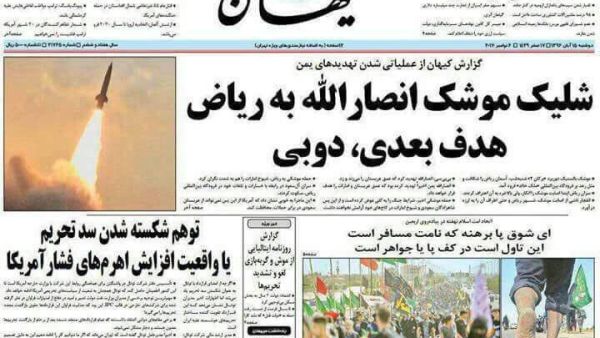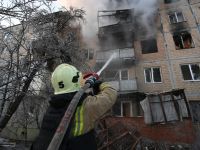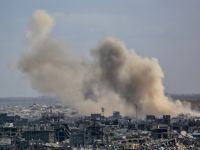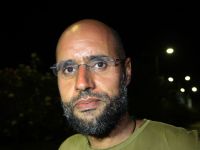- "Missile Fired at Riyadh - Next Target Dubai" said a headline in Iranian paper Kayhan on Sunday
- It followed the attempted targeting of Saudi Arabia's capital the day before by Iran-backed Houthi rebels
- Kayhan listed a number of future targets including Riyadh, Jeddah, Aramco and Dubai
- Riyadh has called Saturday's attack "an act of war" by Iran
by Rosie Alfatlawi
An influential Iranian paper has appeared to suggest that Dubai could be a target for a future missile strike.
In its Farsi edition on Sunday, Kayhan ran the headline “Missile Fired at Riyadh by Ansar Allah - Next Target Dubai.”
Iran’s Keyhan Intelligence paper:
— Imam Tawhidi (@Imamofpeace) November 7, 2017
“Missile fired at Riyadh, next target, Dubai”. In military language, this is an indirect order to strike. pic.twitter.com/BafP5nHDUD
Ansar Allah or “Supporters of God” is the official name for the Iran-backed Houthi rebels against whom Saudi Arabia is leading a campaign in Yemen.
On Saturday Saudi Arabia said it had intercepted a ballistic missile fired from Yemen towards Riyadh’s airport.
While the Houthis had previously targeted the kingdom, this was the closest a projectile had come to a major population center, with the explosion shaking windows in the capital.
Under the provocative headline, Kayhan ran an editorial threatening that Yemen’s Houthis could target any area of Saudi Arabia, according to Kurdish news site Rudaw.
It also detailed potential targets including Riyadh, Jeddah and the oil and gas company Aramco, as well as Dubai in the neighboring UAE, also part of the anti-Houthi alliance.
The headline reportedly saw Kayhan admonished by Iran’s Press Supervisory Board for breaching press regulations on Iran’s national security.
#Iran's press board warns hardline Kayhan over front page that said 'missile targets Riyadh; next is Dubai', says against national interests pic.twitter.com/pRMTYSjgzp
— Golnaz Esfandiari (@GEsfandiari) November 6, 2017
Kayhan’s editor Hossein Shariatmadari holds the official position of representative to Supreme Leader Ayatollah Ali Khamenei.
The New York Times has described the paper as offering “insight into the most extreme views of Iran’s leaders and into the mind-set and plans of those who are at the center of power.”
Rudaw reports that Sunday’s edition also poured scorn on U.S. President Trump’s suggestion that the missile was Iranian, pointing out American weapons sales to Saudi Arabia.
“A shot was just taken by Iran, in my opinion, at Saudi Arabia ... and our system knocked the missile out of the air” Trump had told reporters.
His comments were called “baseless” and “slander” by the head of Iran’s Revolutionary Guards, Mohammad Ali Jafari.
A statement from the Saudi-led coalition on Monday blamed Iran for the attempted attack, calling it “an act of war against the Kingdom of Saudi Arabia.”
Responding to the headline on Twitter, Saudis took it as “confirmation that the rocket was Iranian.”
كيهان صحيفة المرشد تقول صاروخ الرياض من أنصار الله والهدف القادم دبي،فهل بقى عندكم شك بأن إيران راعي رسمي للإرهاب.
— عهدي فهد المرزوق (@AhdiAlmarzouq) November 7, 2017
طبعا الصواريخ مو من إيران pic.twitter.com/ZDHEZX46PC
Kayhan, the newspaper of the [Supreme] Leader, says the Riyadh rocket is from Ansar Allah and the next target is Dubai. Are you still in doubt that Iran is an official sponsor of terrorism?
Another commenter, @Political__00, wondered whether the supposed planned attack on Dubai would take place “at the same time as the next Hezbollah strike,” referring to Iran’s Lebanese ally.
Kuwaiti professor of political science, Dr. Abdallah Nefisi, gained nearly a thousand retweets for his understated comment: “What an annoying neighbor.”
Kayhan followed up the headline on Monday by declaring: "National interests lie in defening the oppressed in Yemen and not in protecting the towers of Dubai."
مجددا صحيفة كيهان المرتبطة بخامنئي تصر على تهديدات ضرب الخليج: المصالح الوطنية تكمن في الدفاع عن المظلومين في اليمن وليس القلق على أبراج دبي pic.twitter.com/LYQFDDqhbT
— Mohammed Alsulami (@mohalsulami) November 6, 2017
Tensions have escalated between regional foes this week.
- 'Free Saad Hariri': Lebanese Convinced Saudis Are Holding Former PM, as Conspiracy Theories Circulate
- Posturing for Power, Trump-touting Are Just Some of the Theories About Saudi's 'Corruption' Arrests
Only hours before the attempted strike on Riyadh, Lebanon’s Prime Minister Saad Hariri had resigned from the Saudi capital, blaming Iran and Hezbollah for sowing regional tension.
Iran’s foreign ministry later called the resignation a “plot jointly designed by Saudi Arabia and Israel.”
Things could yet spiral further, as Saudi Arabia has said over the Houthi missile that it “reserves its right to respond to Iran in the appropriate time and manner, in accordance with international law and based on the right of self-defense."







